Recent Blog Posts
Workers' Compensation and the Loss of a Limb in California
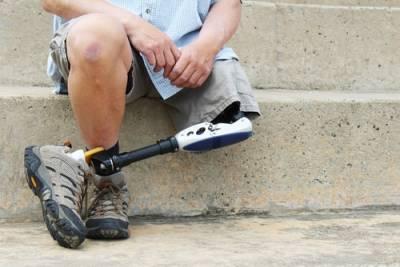 Losing a limb is among the most dreaded types of permanently disabling injuries that one can suffer in the workplace. When you have lost an arm or a leg, or even a finger, it can take a long time for you to get back to a point where you can perform your normal activities of daily living. You will likely need extensive physical therapy, with or without a prosthesis, before you can do things like dressing yourself or cleaning your home. Having a limb severed also tends to come with a lot of pain - the pain alone associated with this injury can keep you from returning to work. While you may eventually be able to adjust to a new way of doing things, you may never be able to return to the type of work you were doing before the injury. Because this is such a major type of Workers’ Compensation claim, it is best to have an attorney handle your case.
Losing a limb is among the most dreaded types of permanently disabling injuries that one can suffer in the workplace. When you have lost an arm or a leg, or even a finger, it can take a long time for you to get back to a point where you can perform your normal activities of daily living. You will likely need extensive physical therapy, with or without a prosthesis, before you can do things like dressing yourself or cleaning your home. Having a limb severed also tends to come with a lot of pain - the pain alone associated with this injury can keep you from returning to work. While you may eventually be able to adjust to a new way of doing things, you may never be able to return to the type of work you were doing before the injury. Because this is such a major type of Workers’ Compensation claim, it is best to have an attorney handle your case.
3 Reasons to Report Every Workplace Injury
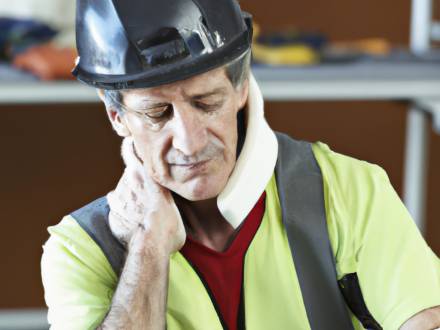 Brushing off a "minor" injury in the workplace can come back to bite you. Some injuries or accidents may seem like no big deal in the moment, only to become a very big deal later on. If you report the injury right away and have the accident thoroughly documented, then you will have solid evidence that you got hurt at work should you need to pursue a Workers’ Compensation claim later on. However, if you fail to report what happened, it might be more difficult to establish that your injury is a workplace injury.
Brushing off a "minor" injury in the workplace can come back to bite you. Some injuries or accidents may seem like no big deal in the moment, only to become a very big deal later on. If you report the injury right away and have the accident thoroughly documented, then you will have solid evidence that you got hurt at work should you need to pursue a Workers’ Compensation claim later on. However, if you fail to report what happened, it might be more difficult to establish that your injury is a workplace injury.
There are a number of reasons that people do not report workplace accidents, ranging from embarrassment to a belief that the injury will quickly heal on its own. Reporting the injury anyway can preserve your claim just in case.
Why You Should Report Every Injury, Every Time
"Minor" injuries can turn out to be a much bigger deal than you may have anticipated. Reasons that you should always report every workplace accident or injury include:
What If a Workplace Injury Leaves Me Disabled?
 Some workplace injuries are much more serious than others. After a simple injury like a sprained ankle, you may need a few weeks off to recover before returning to work. In that case, your claim would be fairly straightforward - you recover lost wages and medical expenses, and you are back at work like nothing happened. However, some workplace injuries can be much more serious. A serious accident that causes a spinal cord injury or traumatic brain injury can leave you permanently unable to return to work. You may have to change career paths, which often involves taking a serious pay cut. Or, you may never be able to work again in any capacity. In these instances, you may be eligible for permanent disability benefits. If you are in this type of situation, it is crucial that you reach out to an attorney for help applying for Workers’ Compensation.
Some workplace injuries are much more serious than others. After a simple injury like a sprained ankle, you may need a few weeks off to recover before returning to work. In that case, your claim would be fairly straightforward - you recover lost wages and medical expenses, and you are back at work like nothing happened. However, some workplace injuries can be much more serious. A serious accident that causes a spinal cord injury or traumatic brain injury can leave you permanently unable to return to work. You may have to change career paths, which often involves taking a serious pay cut. Or, you may never be able to work again in any capacity. In these instances, you may be eligible for permanent disability benefits. If you are in this type of situation, it is crucial that you reach out to an attorney for help applying for Workers’ Compensation.
What to Do If a Workers' Compensation Investigator Is Following You
 In our last blog post, we discussed the role of a Workers’ Compensation investigator. These private investigators are assigned to Workers’ Compensation recipients who have been out of work. Their job is to verify that the recipient appears to have the injury they claim and the physical limitations they claim. Just because one of these investigators has been assigned to your case does not mean that anyone necessarily thinks that you are faking. That said, if you suspect that a Workers’ Compensation investigator is following you, there are a few steps that you can take to protect yourself. One of the first steps you should take is to contact an attorney who can offer you more specific advice that pertains to your individual situation.
In our last blog post, we discussed the role of a Workers’ Compensation investigator. These private investigators are assigned to Workers’ Compensation recipients who have been out of work. Their job is to verify that the recipient appears to have the injury they claim and the physical limitations they claim. Just because one of these investigators has been assigned to your case does not mean that anyone necessarily thinks that you are faking. That said, if you suspect that a Workers’ Compensation investigator is following you, there are a few steps that you can take to protect yourself. One of the first steps you should take is to contact an attorney who can offer you more specific advice that pertains to your individual situation.
Know the Signs of Being Under Surveillance
Is It True That a Workers' Compensation Investigator Might Follow Me Around?
 If workplace injuries are more common in your line of work, you have probably heard the horror stories. Someone else in your industry got hurt at work, filed a Workers’ Compensation claim, and was awarded temporary disability pay. Then, some private investigator jumped out of the bushes in front of his house, snapped a picture of him doing something innocuous like sweeping his porch, and suddenly his claim has been denied. There is some truth—as well as some misleading implications—in stories like this.
If workplace injuries are more common in your line of work, you have probably heard the horror stories. Someone else in your industry got hurt at work, filed a Workers’ Compensation claim, and was awarded temporary disability pay. Then, some private investigator jumped out of the bushes in front of his house, snapped a picture of him doing something innocuous like sweeping his porch, and suddenly his claim has been denied. There is some truth—as well as some misleading implications—in stories like this.
While a Workers’ Compensation investigator may be assigned to your case, your claim is not likely to be denied unless you are seen doing something that your injury should prevent you from doing. If you suspect that one of these investigators has been assigned to your case, it is important that you speak with a lawyer right away and follow their instructions.
The Role of a Workers’ Compensation Investigator
Can I Receive Workers' Compensation If I Was Assaulted at Work?
 Workplace violence is a nationwide problem. Anyone in any line of work could experience an assault while on the job. In the last few years, health care workers have been particularly vulnerable to being attacked by patients or their family members. Some lines of work may inherently involve some level of violence - for example, if you are a bouncer at a nightclub then it is far more likely that you may be injured intentionally while working. In other lines of work, assaults are far less likely but do still happen. The good news is that if you were attacked while working, you are likely eligible to receive Workers’ Compensation. Depending on who the assailant was, you may also have additional options for pursuing a claim.
Workplace violence is a nationwide problem. Anyone in any line of work could experience an assault while on the job. In the last few years, health care workers have been particularly vulnerable to being attacked by patients or their family members. Some lines of work may inherently involve some level of violence - for example, if you are a bouncer at a nightclub then it is far more likely that you may be injured intentionally while working. In other lines of work, assaults are far less likely but do still happen. The good news is that if you were attacked while working, you are likely eligible to receive Workers’ Compensation. Depending on who the assailant was, you may also have additional options for pursuing a claim.
Getting Workers’ Compensation After Experiencing Workplace Violence
No one should be attacked while they are trying to do their jobs. Even if you were not seriously injured physically, you may still have suffered a significant emotional injury. Being assaulted can be traumatic for anyone. The costs associated with a workplace assault are likely to involve both medical treatment and counseling or therapy.
3 Elements You Must Prove to Collect Workers’ Compensation in California
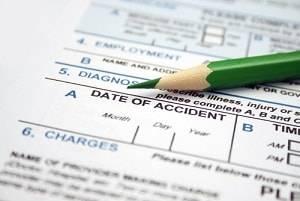 For as straightforward as Workers’ Compensation may seem, actually receiving it can become quite a challenge. Workers’ Compensation is a type of insurance program for employers, designed to help cover expenses when someone gets hurt on the job. Workplace injuries can happen to anyone, whether you work on a construction site, in a medical facility, or at a desk. One fact that often surprises injured workers is that they do not need to prove that their employer was at fault for the accident. Even if an employer follows the correct safety protocols for the type of work being performed, injuries can still occur. This is why you are not required to show that your employer was negligent in any way.
For as straightforward as Workers’ Compensation may seem, actually receiving it can become quite a challenge. Workers’ Compensation is a type of insurance program for employers, designed to help cover expenses when someone gets hurt on the job. Workplace injuries can happen to anyone, whether you work on a construction site, in a medical facility, or at a desk. One fact that often surprises injured workers is that they do not need to prove that their employer was at fault for the accident. Even if an employer follows the correct safety protocols for the type of work being performed, injuries can still occur. This is why you are not required to show that your employer was negligent in any way.
However, there are a few things that you do need to prove before you can collect Workers’ Compensation benefits. Our lawyers will help you begin collecting the evidence you may need right away, so it is important to call us as soon as you can after a workplace accident.
Top 5 Causes of Warehouse Injuries in Santa Clara County
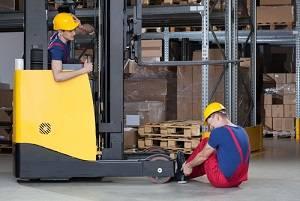 More and more people are doing the bulk of their shopping online rather than in a brick-and-mortar retail store. This has resulted in warehouses and order fulfillment centers popping up everywhere. These centers can employ hundreds of people and often have high turnover rates. A high percentage of warehouse employees are new to the job and may not have received adequate training in safety practices.
More and more people are doing the bulk of their shopping online rather than in a brick-and-mortar retail store. This has resulted in warehouses and order fulfillment centers popping up everywhere. These centers can employ hundreds of people and often have high turnover rates. A high percentage of warehouse employees are new to the job and may not have received adequate training in safety practices.
Anyone who has spent time working in a warehouse or order fulfillment center can tell you that safety training is essential when you are working in an enormous building filled with rows of products stacked to the ceiling. It is no surprise that workplace injuries are not uncommon in these locations. If you are injured on the job, you are likely entitled to financial help through Workers’ Compensation. An attorney can help make sure that you receive the full amount of compensation you deserve.
Can I Get Workers' Compensation After an On-the-Job Car Accident?
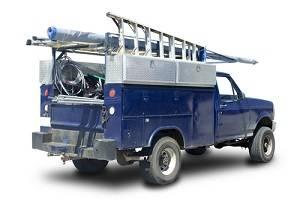 Determining liability after a car accident can be tricky - even trickier if the accident was work-related. As a general rule, if you were actively carrying out a work-related task, you can probably use Workers’ Compensation to recover damages. However, depending on what happened, there could be a liable third party you could pursue compensation from. A number of circumstances and factors can affect liability when an auto accident is work-related. In some cases, you may have multiple options. If you were hurt in a car accident at work, you will probably need to contact an attorney who can assess your case and determine how best to go about getting you compensated.
Determining liability after a car accident can be tricky - even trickier if the accident was work-related. As a general rule, if you were actively carrying out a work-related task, you can probably use Workers’ Compensation to recover damages. However, depending on what happened, there could be a liable third party you could pursue compensation from. A number of circumstances and factors can affect liability when an auto accident is work-related. In some cases, you may have multiple options. If you were hurt in a car accident at work, you will probably need to contact an attorney who can assess your case and determine how best to go about getting you compensated.
What If I Get in an Accident on My Commute?
If you were merely commuting to or from work, you were probably not on the job for purposes of getting Workers’ Compensation. This does not mean you are out of luck - you will just need to pursue compensation from the responsible driver or their insurance company. The same applies to accidents that occur while you are on break.
Top 3 Types of OSHA Violations That Get People Hurt
 The Occupational Safety and Health Administration (OSHA) sets out safety standards for a good reason. Without these federal standards in place, quite a few more workers would be trying to do their jobs in an unsafe environment. OSHA standards exist to force employers to take employee safety seriously and put measures in place to minimize the occurrence of workplace injuries. However, there are some employers who still stubbornly refuse to comply with OSHA’s safety requirements. When a violation occurs, everyone on the job site could be at risk.
The Occupational Safety and Health Administration (OSHA) sets out safety standards for a good reason. Without these federal standards in place, quite a few more workers would be trying to do their jobs in an unsafe environment. OSHA standards exist to force employers to take employee safety seriously and put measures in place to minimize the occurrence of workplace injuries. However, there are some employers who still stubbornly refuse to comply with OSHA’s safety requirements. When a violation occurs, everyone on the job site could be at risk.
Each year, OSHA publishes a list of the most commonly cited safety violations. Sadly, these violations are often not discovered until someone gets hurt and needs workers’ compensation. Note that you do not need to prove that your employer was at fault or in violation of a safety law to receive workers’ compensation. However, a violation does increase the chances that an injury will occur. Any time you suffer a workplace injury, the smart move is to immediately contact an attorney.








